The 3rd PA Regiment is a proud member of Historical Military Impressions, our parent organization. HMI was founded in the fall of 1979. They are charted through the state of Pa. as a non-profit educational organization. Their goal is to portray the life and times of the American men and women who served in the Armed Forces from Pre-Revolutionary times to the present. HMI has twice received the Valley Forge Freedoms Foundation Award for portrayal of the fighting men and women in the History of the United States.


The regiment has a long and rich history. It was first known as the 2nd Pennsylvania Battalion, and was raised on December 9, 1775, at Philadelphia, Pennsylvania for service with the Continental Army.
The regiment would see action during the Battle of Valcour Island, The Battle of Germantown, the Battle of Brandywine, the Battle of Monmouth, and the Battle of Springfield.
The regiment was furloughed, on June 11, 1783, at Philadelphia, Pennsylvania and disbanded on November 15, 1783.

Here are the details:
- The Regiment was authorized on December 9, 1775 in the Continental Army as the 2d Pennsylvania Battalion.
- Organized between January 2 and February 17, 1776 at Philadelphia to consist of 8 companies.
- It was assigned on January 8, 1776 to the Canadian Department.
- Relieved on July 2, 1776 from the Canadian Department and assigned to the Northern Department.
- It was assigned on July 20, 1776 to St. Clair's Brigade, an element of the Northern Department.
- Relieved on November 18, 1776 from St. Clair's Brigade.
- Reorganized and re-designated January 1, 1777 as the 3rd Pennsylvania Regiment, to consist of 8 companies.
- Relieved on January 24, 1777 from the Northern Department and assigned to the Main Continental Army.
- It was assigned on May 22, 1777 to the 3rd Pennsylvania Brigade, an element of the Main Continental Army.
- Consolidated on July 1, 1778 with the 12th Pennsylvania Regiment and re-designated as the 3rd Pennsylvania Regiment, to consist of 9 companies.
- Relieved on July 22, 1778 from the 3rd Pennsylvania Brigade and assigned to the 2nd Pennsylvania Brigade, and element of the Main Continental Army.
- Consolidated on January 17, 1781 with the 11th Pennsylvania Regiment and re-designated as the 3rd Pennsylvania Regiment; concurrently furloughed at Trenton, New Jersey, and relieved from the 2nd Pennsylvania Brigade.
- Reorganized on January 1, 1783 at Philadelphia, to consist of 9 companies, and assigned to the Middle Department.
- Furloughed on June 11, 1783 at Philadelphia.
- Disbanded on November 15, 1783.
Source: https://revolutionarywar.us/continental-army/pennsylvania/
Becoming a Member
We have no requirements concerning who may join the 3rd PA Regiment, however a person must be at least 16 years of age to take the field as a soldier under arms.
Considering our events mainly take place over a weekend, you should be of suitable health to spend that much time outdoors and do exercise such as marching and drilling.
New recruits wishing to portray Regimental Drummers and Fifers may take the field at 12 years of age.
Also, the armies of the times had a large number of women and children attached to them. This group of people is generally known as ‘camp followers.’ As the regiments moved from camp to camp during the war, family members earned extra money by washing, mending, and cleaning clothing as well as selling food and spirits near the camps.
How Can I Get Involved?
“Living History” is definitely a family oriented hobby. Spouses, children and significant others are encouraged to take part by representing their 18th century counterparts. Clothing, accouterments and patterns for civilians, which observe the same standards as the soldiers’, are available through the same approved sutlers that supply military equipment.
Our members work to educate the public about the life of the colonial soldier, and to honor the sacrifices made during the darkest hours of the American War for Independence. To that end, we have recreated, as accurately as our research has allowed, the 3rd PA Regiment, Light Infantry Company.
We portray the military life and customs of the American soldier and camp follower during the period in all of its aspects, allowing the public to understand the hardships and lifestyles of the men and women who fought for America’s Independence. This includes camp life, food, uniforms, drill, weapons, tactics and of course, history.
Throughout the year, we spend select weekends together with other recreated regiments to present “living history” demonstrations of military drilling, battles and camp life primarily within the Eastern Pennsylvania and New Jersey area. We also visit schools and interested civic groups, participate in parades, and ceremonial events.
Each member pays annual dues and maintains his or her own uniform and equipment.
We are excited to help you get started!
Whenever possible, it’s our goal to get new members actively participating immediately. We will supply you with Regiment-owned “loaner” clothing and gear (we call them accoutrements) and give you drill maneuver instructions.
You should begin assembling your own accoutrements over the course of a year or two. It’s a goal of our members to try to make as much of our gear ourselves as possible, however most items can be purchased from approved artisans and sutlers.
Although new historical research comes to light now and again, our uniforms and equipment are the product of years of research and we take pride in their accuracy. We use authentic materials when possible, as well as period correct methods of tailoring and construction. The members of our regiment are always available to lend a helping hand in developing your 18th century clothing and persona.
Submit an Application to the Unit
While we take our impressions very seriously, we definitely have a good time together and love to have fun. Join us and experience and demonstrate the lives of Continental soldiers during the day and stay to celebrate the union of reenactors around the camp-fire at night!
Well, if you’re still reading this we know you’ll most likely want to contact us for more information. Before you know it, you’ll be marching in the field with your new friends!
To take the next step toward membership; please contact our Recruiting Officer by filling out the form linked below.
Online HMI ApplicationUniform Guidelines for the 3rd PA Regiment
Clothing Guideline Standards for Men-at-Arms of the 3rd Pennsylvania Regiment, Light Infantry Company.
Our guidelines are designed to allow the New Recruit or the Established Veteran to present an impression representative not only of the time period, but also historically accurate. This approach allows us to meet our unit goal of aiding in the preservation of history and the accurate interpretation of the military and civilian roles of men, women and children in 18th Century America for the education of the general public.
Unacceptable clothing is that which is not period correct or has been constructed of man-made fibers, or having modern closures (zippers, elastic, Velcro, etc.). Clothing constructed of man-made fibers have proven capable of providing serious burn injury when exposed to fire or high heat causing severe burns, and include, but are not limited to, products made from Elastic, Rubber, Nylon, Polyester, Lycra, Spandex, etc.
Our guideline offers a number of choices to create an authentic, documentable uniform and denotes a basic recommendation for the Recruit.
Smallclothes -Essential
Color choices within the essential smallclothes are noted as white or natural due to the ease of availability. It is recommended that the Recruit consult with an existing member for selection if they are unfamiliar with the historical accuracy of a particular item.
- Shirts: linen, fustian, or cotton; common work/military shirt. Natural or white
- Breeches: Linen, wool or cotton canvas; drop front with buttons of plain pewter, wood, or fabric covered. Natural, white, or off-white
- Stockings: Cotton, linen, silk or wool. White or off-white
- Waistcoat: Linen or lightweight wool, sleeveless, 1770’s cut & length, with buttons of plain pewter or fabric covered. White or off-white
Footwear
Authentic reproduction shoes: black, rough side out, buckle closure
Modern Shoes with Half Gaiters: Black shoes - not too obviously modern, hidden under well-fitted half gaiters. Care should be taken to avoid heavy soled shoes or boots. Modern shoes may be worn until such time that authentic reproduction shoes can be purchased.
Half Gaiters: can be commercial or homemade using black linen, painted cotton canvas, or black wool. Should be well fitted with pewter buttons.
Moccasins: Unacceptable
Hats
Light Infantry felt helmet trimmed in white with Plume and Cockade
Cocked hat: Black Military cocked hat (no silk cockades, feathers, buck tails, pins, etc.)
Round hat: Black left with short brim (can be a trimmed hat blank), cocked up left side (not fancy)
Knit cap (worn in cooler weather): So called Monmouth cap -knit cap that conforms to the skull or Toque or Dutch cap which are longer, half-football shaped knit caps
Haberdashery
Neck stock/ Kerchief–Essential: Neck stock of black linen or cotton, with black linen tape ties. Kerchief of linen, cotton or silk, black or white solid color
Garters–Essential: black leather with brass buckles
Glasses: Contact lenses or squinting is most appropriate however inexpensive period spectacle glasses/frames are available. Round lenses are correct for our period
Hair Style: Almost any modern style/color is acceptableMustaches and beards: Clean shaven (three days beard growth at most) was the order of the day in the Continental Army, and that is what we would like to see.
Outer Wear/Coat
Regimental Coat: Blue faced in red with pewter buttons. May be regular length but preferred is a shortened coatee, suitable for our light infantry impression
Sources of materials
A large number of Clothing, Equipment and Material suppliers, or Sutlers, are available to both the New Recruit and Experienced Veteran in the recreation of their uniforms.
The below noted sutlers are those from whom the unit has found success in the creation of their own uniforms, and while by no means restricted to their exclusive use, great care and discussion should be held prior to consideration of sources other than those noted.
- Avalon Forge -Camp Items
- Burnley & Trowbridge
- C&D Jarnagin
- Carrie Efinger
- Dixie Gun Works -Black Powder Items
- Fugawee –Shoes
- G. Gedney Godwin
- Kochan-Phillips Historic Textiles–Wool, Linen cloths
- Najecki Reproductions
- Rancocas Merchant
- Smiling Fox Forge
- Smoke & Fire Co.
- Jas. Townsend
- Samson Historical
- Hot Dip Tin
The members of the 3rd PA Regiment attend many events throughout the year. We participate both in re-enacting battles and also in living history events held throughout the area.
Everyone of our members including our ladies and children ( camp followers), can be involved in every event. As a matter of fact, every unit depends upon the ladies to help in the camp for every event!
Please take a few moments to enjoy some of the images here to see our members in action!
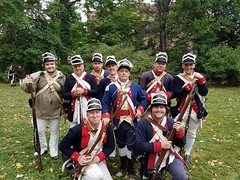
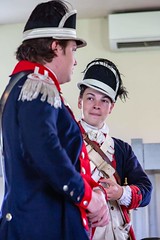
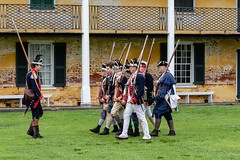
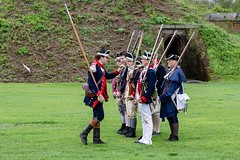
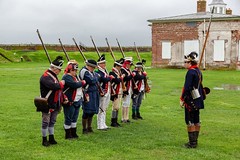
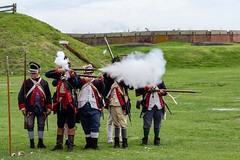
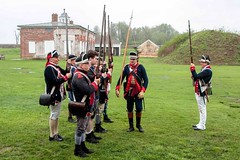
Associated Links
The Continental Line
https://www.continentalline.org/CL/Smiling Fox Forge
https://smilingfoxforge.com/index.phpTurkey Foot Trading Company
http://www.turkeyfootllc.com/Bethlehem Trading Post
http://bethlehemtradingpost.com/Samson Historical
https://www.samsonhistorical.com/Smoke & Fire Company
https://www.smoke-fire.com/Roy Najecki Reproductions
https://www.najecki.com/repro/reproindex.htmlG. Gedney Godwin
http://gggodwin-com.3dcartstores.com/Historic Hope Lodge
http://www.historichopelodge.org/Moland House Historic Park
https://moland.org/Fort Mifflin Historic Park
http://www.fortmifflin.us/Monmouth Battlefield State Park
https://www.state.nj.us/dep/parksandforests/parks/monbat.htmlWashington Crossing Historical Park, PA
https://www.washingtoncrossingpark.org/Washington Crossing State Park, NJ
https://www.state.nj.us/dep/parksandforests/parks/washcros.html